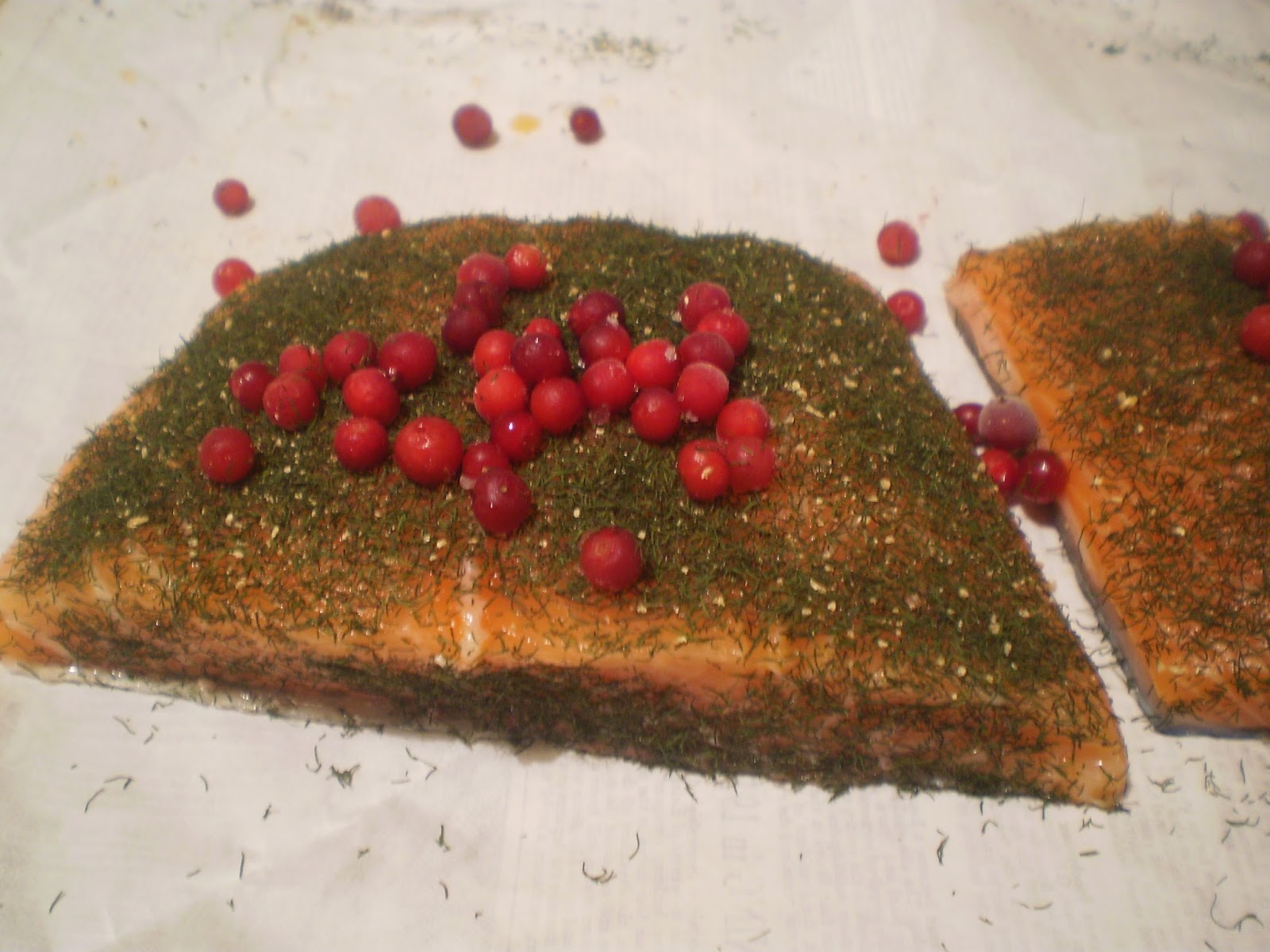Wild Baltic salmon is a well-known local delicacy in Latvia. We are very lucky because besides brightly colored farmed salmon from Norway we can still spin in our rivers or buy in the Fish Pavilion of the Central Market wild Baltic salmon. Unfortunately, the salmon season is now closed, yhat's why I prepared this recipe with store bought Norwegian salmon.
There are many different ways of preparing salmon, but the easiest and fastest method is to mild-cure it. Mild-curing is a century-old food tradition ideally suited to Latvia’s climate. Initially it was method to preserve raw fish, therefore the proportion of salt and sugar was important. Nowadays dry cure has become sweeter. Seasoning can vary from classic dill to seaweed, juniper and fresh berries (lingonberries, elderberries, cloudberries). Addition of pink peppercorns just before serving is a modern twist to give it nervous finish. For Latvians lingonberries are very traditional wild berries everyone can pick for free in the state owned forests. When ripe they are sour sweet with a bitter edge. Dill is by farthe most popular herb in Latvia. It's used to season meats, fishes and veggies, it's also used to flovour all sorts of picles and finally as a garnish.
Instead of applying pressure by weighing fillets down, some modern cooks wrap them tightly in several layers of cling film. While this latter technique is probably more convenient, it may not give the best results. Fish meat must change its structure to firm and dense, as salt draws the moisture out. Dry cure dissolves in it creating a brine, where fully covered fish can be kept for months. We, Latvians eat mild-cured salmon on thinly sliced buttered toast (white bread) for breakfast or on festive occasions. A very similar curing technique is applied on salmon in Scandinavian countries to prepare world famous Gravadlax.
There are many different ways of preparing salmon, but the easiest and fastest method is to mild-cure it. Mild-curing is a century-old food tradition ideally suited to Latvia’s climate. Initially it was method to preserve raw fish, therefore the proportion of salt and sugar was important. Nowadays dry cure has become sweeter. Seasoning can vary from classic dill to seaweed, juniper and fresh berries (lingonberries, elderberries, cloudberries). Addition of pink peppercorns just before serving is a modern twist to give it nervous finish. For Latvians lingonberries are very traditional wild berries everyone can pick for free in the state owned forests. When ripe they are sour sweet with a bitter edge. Dill is by farthe most popular herb in Latvia. It's used to season meats, fishes and veggies, it's also used to flovour all sorts of picles and finally as a garnish.
Instead of applying pressure by weighing fillets down, some modern cooks wrap them tightly in several layers of cling film. While this latter technique is probably more convenient, it may not give the best results. Fish meat must change its structure to firm and dense, as salt draws the moisture out. Dry cure dissolves in it creating a brine, where fully covered fish can be kept for months. We, Latvians eat mild-cured salmon on thinly sliced buttered toast (white bread) for breakfast or on festive occasions. A very similar curing technique is applied on salmon in Scandinavian countries to prepare world famous Gravadlax.
70g rock salt (or non-iodized sea salt)
30g demerara sugar
2 handfuls lingonberries (Vaccinium vitis idaea)
2tbsp. dried dill (or 6tbsp. finely chopped fresh dill)
1tsp. ground white pepper
pink peppercorns for serving
Clean the fillets with kitchen paper, but do not wash them and remove any bones. Mix the rock salt, sugar and white pepper. Lay two fillets skin down, rub them with dill and work it into the topside of the fillets. Then add an even layer of lingonberries. Scatter over the dry cure mix so that the flesh is completely covered and press on vigorously. Flip over so the thick edge of one fillet fits on the top of the thin edge of the other. Put it in a tray that is just slightly wider, cover the fillets with a wooden board and place a weight on the top. Put the tray into the fridge for 48 hours. Before serving pat the fillets dry with kitchen paper and sprinkle with pink peppercorns. Lay the fillets skinside down and cut off thin slices with a sharp knife. Serve it cold on buttered toast or with a poached duck egg. Fillets fully covered by brine can be kept in fridge for at least 2 weeks.




